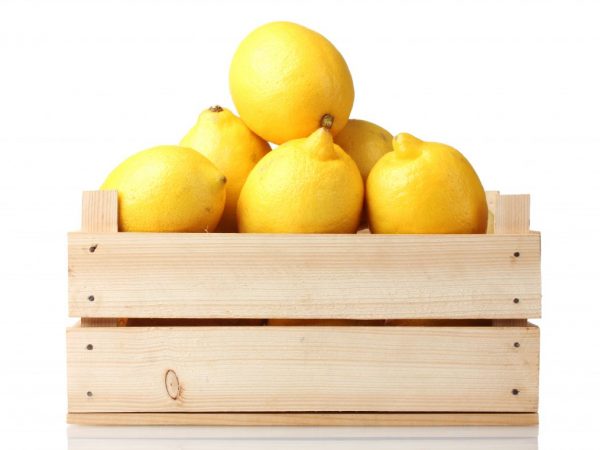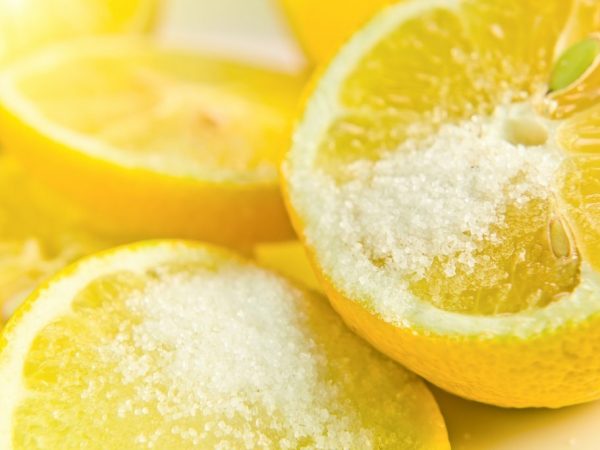Storing lemon at home
Lemons are healthy citrus plants that are rich in vitamins and minerals. The strong antibacterial effect allows them to be used in the treatment of viral diseases. Storing lemon at home depends on the variety and ripening period. The preservation of citrus fruits is ensured by a refrigerator or a cold dark room.

Storing lemon at home
Storing lemons in the refrigerator
Refrigeration is an affordable way to keep citrus fruits for 3-8 weeks. It is best to use the vegetable compartment for storing lemons. The temperature should not exceed 7 ° C-9 ° C.
Proper preparation of food will increase its shelf life in refrigerator conditions:
- they are placed under the flow for 2-3 minutes;
- placed in a dry chilled glass or plastic container;
- tightly close the container on top with a lid.
It is also convenient to store lemons in the refrigerator using plastic bags that can be closed with a latch.
Additional procedures to increase the shelf life of lemons in the refrigerator:
- Lubricate the skin of the lemon with sunflower or olive oil. This prevents the fruit from rotting.
- Wrap citrus fruits in paper napkin. It will absorb moisture from the surface of the peel, which will prevent the formation of rot.
- Place the fruit in a bowl of water. This prevents them from drying out. Water needs to be renewed every 2 days.
It is possible to store lemons for a long time by freezing them in the freezer compartment. The disadvantage is the loss of taste and useful qualities of the product. Also, the zest loses its flavor.
Storing lemon indoors
At room humidity and temperature, citrus fruits do not lose their qualities for 10 days. Humidity should not exceed 80%. It is best to store citrus in a drawer and open it only when needed.
Ways to increase the shelf life of lemons at home:
- Use of coating. Lemons stay tasty and fresh for a long time if coated with refined olive or sunflower oil.
- Using sand. Unpeeled fruits are placed in a container and covered with calcined sand. Lemons are wrapped in parchment.
- Using wax paper. The disadvantage of this method is its high cost. It is possible to make paper yourself by melting wax from a candle, smearing it on the fruits and wrapping them with paper.
- The use of vacuum packaging. For vakumirovanie packaging, use special evacuators or independently suck air from the cans by heating.
Storage rules in room conditions:
- do not pack in cellophane;
- limit the sun's rays on the fetus;
- use only open containers.
Storing sliced citrus
To keep lemons cut at home, you only need to place them cut on the surface. The fruits are covered on top to slow down drying.
To store lemons at home, if they have already been cut, it is better to use lemongrass.It keeps all citrus fruits fresh and tasty in the refrigerator for more than 10 days.
You can keep the cut lemon fresh if:
- grease the cut with a thin layer of egg white;
- put a cut on a surface that has been smeared with apple cider vinegar (you can use fresh honey);
- store salt, which absorbs moisture, and bay leaves next to the lemon.
Sugar use

Sugar helps keep lemon fresh for six months
Natural preservatives are used to keep the sliced lemon from spoiling. Sugar keeps the fruit fresh and healthy for 4-6 months.
Fruits cut into thin pieces are placed on the bottom of a flat container. Sprinkle them on top with a layer of sugar. In this way, the entire container is filled.
It is better to cut it with a sharp knife so that the pieces are thin. The thickness of the slices should not exceed 4 mm. Sugar and citrus are added in a ratio of 1 to 1. Lemon storage in this way is carried out with or without the peel.
After packing, the container is closed and left for 10 days at room temperature. When the sugar dissolves, the container is moved to the refrigerator for permanent storage. Also, in cold weather, sliced fruit in sugar is left on the street or on the balcony, if the temperature does not drop below 0 ° C at night.
Bank storage
There are 3 main ways to store citrus fruits in a jar:
- Simple sterilization. The jar is thoroughly cleaned and the fruits are placed in it. Store in a tightly closed container in a cool, dark room or basement.
- Using a candle stub. The fruits are also placed in a sterilized jar. They also put a cinder there and close the container tightly. Store in a ventilated area.
- Steam sterilization. In a sterilized jar, which is located above the steam bath, the fruits are gradually placed one by one until the container is filled. Store in a cool room or basement.
Storage in a jar of water
This method increases the safety of fruits several times. The fruits peeled from the upper ball are placed in a glass container and the purified liquid is poured so that it covers them completely.
Store the jar in the vegetable compartment of the refrigerator at a temperature of 6 ° C. The water is changed every 2 days.
Keeping lemon without zest
This method is useful if the fruit was purchased only for obtaining the zest, but it is a pity to throw them away. Without a top ball of skin at home, citrus fruits quickly dry out and lose their properties.
To keep the fruits fresh for a long time, they are placed in a glass container and stored in the refrigerator. The more the container is filled, the longer the citrus fruits will stay, since less oxygen will flow to them. Also, their surface is smeared with sugar syrup or honey.
It is important that fruits without zest do not receive direct sunlight and moisture does not accumulate on them. Salt and a paper napkin save you from water.
To preserve the beneficial properties of the fruit without the zest, they are dried. They will lose their juiciness, but the vitamin and mineral composition will not change much.
Dried both naturally and using the oven. Lemons dry on their own in 4-6 days. They are cut into slices, laid out on the surface and turned over once a day.
In the oven, the slices dry in 4 hours at a temperature of 55 ° C. Dried wedges are best kept in tight paper bags.
Conclusion
Citrus fruits are forbidden to eat if they have been in the freezer or refrigerator for more than 4 months and for 15 days in room conditions: fungus and rot appear on their surface.
If you eat a stale lemon, there is a risk of poisoning. A sign of unsuitable fruit is the presence of unnatural spots of green and white on the surface.

